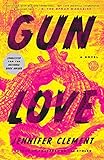This piece is the first in a series of author interviews about the craft of writing conducted by Chigozie Obioma for The Millions.
Jennifer Clement’s Gun Love is a beautiful novel. The writing is so lovely that, at times, it seems the author is observing the world through a peephole that foregrounds and magnifies every minute object. A tired person is described as being unable to make “my fist,” and a woman’s love interest is described as “the song inside her body.” The characters are eccentric, unforgettable, and nuanced. Pearl, especially, is a wonder: so finely shaped and created.
For the first in a series of interviews focused on the craft of writing, I asked Clement a few questions about her process and technique. If you’ve read Gun Love and have questions for Clement, please post them in the comments section before May 22. We’ll send the first three to the author, making this an ongoing conversation.
Chigozie Obioma: Did you do any research for this novel? I’m curious to know how prior knowledge shaped the lives of the characters in this novel since—as I understand—you have not even been living in the U.S. for a while now.
 Jennifer Clement: Yes, I did a lot of research for this novel. I think of some of my books as an iceberg and what the reader reads is the surface of something much deeper. However, the research did not shape my characters. The investigation was into people who live in cars, gun violence, guns, and I did interview survivors of gun massacres. I’m on the advisory board of an organization called SHOT: We the People headed by Kathy Shorr, who photographs survivors of gun shots and how their bodies have been devastated. The truth is I’ve hardly ever lived in the United States. I grew up in Mexico City, where I live today. I lived in New York City from 1978 to 1987. My memoir Widow Basquiat is about this time in New York.
Jennifer Clement: Yes, I did a lot of research for this novel. I think of some of my books as an iceberg and what the reader reads is the surface of something much deeper. However, the research did not shape my characters. The investigation was into people who live in cars, gun violence, guns, and I did interview survivors of gun massacres. I’m on the advisory board of an organization called SHOT: We the People headed by Kathy Shorr, who photographs survivors of gun shots and how their bodies have been devastated. The truth is I’ve hardly ever lived in the United States. I grew up in Mexico City, where I live today. I lived in New York City from 1978 to 1987. My memoir Widow Basquiat is about this time in New York.
Because I live in Mexico, Gun Love is also about how U.S. guns get to Mexico. This has also been a part of my research and the numbers are chilling. As a low count, 20,000 guns cross the border into Mexico every day. There are more than 8,000 gun shops on the U.S. side of the border. This means that both poverty and violence in Mexico and Central America is fueled by U.S. guns.
CO: The characters are eccentric, and this is why they are also so compelling. This, of course, makes them very memorable. Margot, for instance, is able to live in her father’s house for two months with a baby without anyone knowing a child was there. What was the inspiration for such a woman?
JC: I’ve actually read about women who were able to hide their newborn babies for quite some time and I’ve always found this fascinating. It’s not hard to do especially if you’re a lonely girl living in a big house. There is no character in Gun Love who is based on any real person. At a certain point of my writing, I begin to feel a strong tenderness for my characters, which is a kind of love, and then I know the characters have come alive. What you point out reminds me of what Flannery O’Connor said when asked why her characters were so eccentric, “Whenever I’m asked why southern writers particularly have a penchant for writing about freaks, I say it is because we are still able to recognize one.”
CO: For me, this is also in many ways a philosophical novel. There is wisdom, quiet wisdom I’d say, scattered throughout the page in form of aphorisms that Margot passes on to her daughter and therefore the reader (e.g., “If you don’t dream at night then only this life matters.”). Were you thinking specifically in these lines?
JC: I’m glad to hear you think this, as I do also. Part of developing a character is finding out their credo, what they live by. I would never want to write a didactic novel, but a philosophical one, yes. I’m interested in the fact that we spend half our day sleeping in a completely different world. One of my favorite poems is John Donne’s “Elegy X, The Dream” where he says, “If I dream I have you then I have you for all our joys are but fantastical.” I also know it’s in dreams and in the imagination where the muses live.
from The Millions http://bit.ly/2JiMYN8

No comments:
Post a Comment